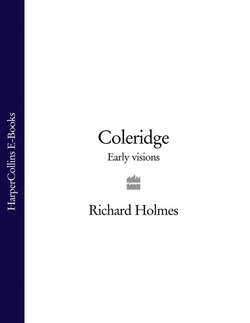Читать книгу Coleridge: Early Visions - Richard Holmes - Страница 31
7
ОглавлениеIt was hardly surprising that Coleridge did not return to Cambridge in September 1793 in the most prosaic state of mind. In fact, he lingered in London to see Mary, and much of the money provided for his debts was squandered on unspecified entertainment. “So small a sum remained, that I could not mock my Tutor with it.”43
By the end of October his “Embarrassments” buzzed round him “like a Nest of Hornets”, and in November he gave up all attempts to get his affairs under control. Instead he abandoned himself to a whirl of drunken socialising, alternating with grim solitary resolutions to shoot himself as the final solution to bad debts, unrequited love, and academic disgrace. (The example of Frank seems to have mixed itself up with the fate of Goethe’s Young Werther.) No letters survive from this traumatic month, for not even the Evans family were now in his confidence, but he subsequently gave George a lurid account.
My Agitations were a delirium – I formed a Party, dashed to London at eleven o’clock at night, and for three days lived in all the tempest of Pleasure – resolved on my return – but I will not shock your religious feelings – I again returned to Cambridge – staid a week – such a week! – Where Vice has not annihilated Sensibility, there is little need of a Hell! On Sunday night I packed up a few things, – went off in the mail…still looking forwards with a kind of recklessness to the dernier resort of misery…44
This was the Sunday of 24 November.
Oddly enough, the one thing that flourished during these delirious three weeks of November was Coleridge’s poetry. In a desperate attempt to recoup his debts, Coleridge had put money in an Irish lottery in London, and while awaiting the outcome he wrote an Ode “To Fortune”, composed while walking from a tavern in Gray’s Inn Lane, and the lottery shop in the Cornhill. He submitted it to the Morning Chronicle, and to his amazement it was published in the paper on 7 November, earning him a guinea (unlike the lottery). This was, ironically, his first professional publication: and the following year the same newspaper was publishing an entire sequence of his sonnets. It contains a suggestive confusion of unpaid debts with unrequited love, both exciting bitter and evidently liberating tears:
Let the little bosom cold
Melt only at the sunbeam ray of gold –
My pale cheeks glow – the big drops start –
The rebel Feeling riots at my heart!45
It was this rebellious release of dammed-up, pent-up emotions – going all the way back to childhood – that was evidently so important to Coleridge throughout these catastrophic and glorious weeks.
Despite the “delirium”, Coleridge was also regularly attending a newly founded Literary Society in Cambridge, formed by Charles Le Grice and a Trinity College undergraduate, Christopher Wordsworth – younger brother of William. The minutes between 5 and 13 November record a brilliant and relatively sober Coleridge, declaiming his love-poetry of the summer, “spouting” Bowles, quoting the Greek poets with crashing fluency, and studiously promising to deliver a special paper on modern poetry. His poem “To Fortune” was read from the newspaper to great applause; and there was earnest discussion of the elder Wordsworth’s “Evening Walk”. The only ominous note was his failure to appear and deliver his special paper at the Society’s meeting of 20 November, as arranged. But his absence was not especially remarked upon, for his inspired vagaries were obviously well-known among the undergraduates.46
While he should have been debating the finer points of verse at Trinity, Coleridge was probably drinking heavily in Holborn; but very little is known of this final climactic week in London at the end of November. Coleridge later embroidered such a tapestry of adventures that they became the subject of a novel by his friend Charles Lloyd, Edmund Oliver, published in 1798. But the absence of any reliable witness is indicated by the fact that no friend knew of his whereabouts, or succeeded in making contact with him, for the next two months, until February 1794. As on that famous night at Ottery, he simply ran away in a storm of emotion, and awaited discovery and rescue, with “inward and gloomy satisfaction”.
Amid the general chaos of debts and guilt and misery, so strangely shadowed by the growing confidence in his own powers as a poet, there may have been some final, isolating horror. He might, for example, have thought that his whoring had given him a venereal disease.47 Certainly his final resolution was not an act of rebellion at all, but a bitterly remorseful attempt to redeem his honour in the most humiliating tradition of family loyalties. Like John, like James, like Frank, he volunteered for the army.*
On 2 December 1793, he accepted the six and a half guinea bounty of a volunteer private in the 15th Light Dragoons, reporting to Colonel Gwynne’s recruiting office in Chancery Lane. Two days later he was sworn in at the regimental headquarters in Reading, and was issued with leather breeches, stable jacket, riding boots, and a carbine, and began his training mucking out the stables. He gave his name, according to his initials, as Silas Tomkyn Comberbache. The outlandish surname, somehow so expressive of his total inability to ride a horse, may have been a last, muffled dactylic tribute to Frank, whose middle name was Syndercombe. He became, in his own mocking phrase, “a very indocile Equestrian”.48
